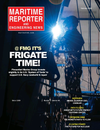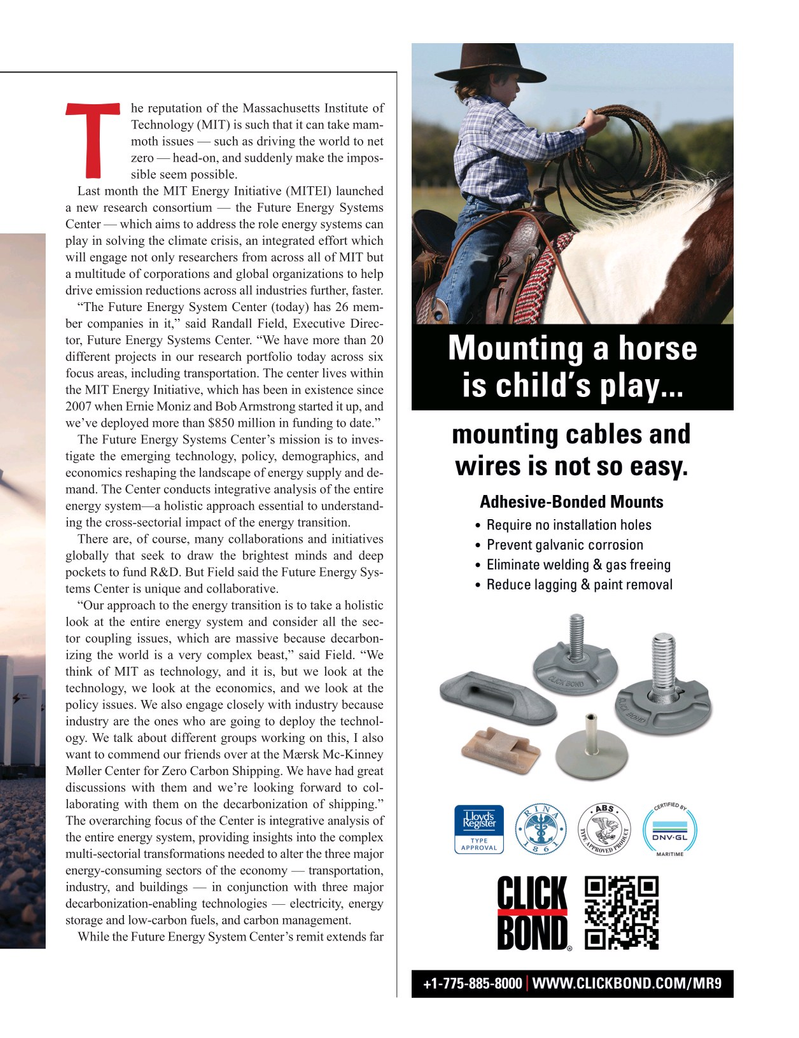
Page 13: of Maritime Reporter Magazine (February 2022)
Government Shipbuilding
Read this page in Pdf, Flash or Html5 edition of February 2022 Maritime Reporter Magazine
he reputation of the Massachusetts Institute of
Technology (MIT) is such that it can take mam- moth issues — such as driving the world to net zero — head-on, and suddenly make the impos-
T sible seem possible.
Last month the MIT Energy Initiative (MITEI) launched a new research consortium — the Future Energy Systems
Center — which aims to address the role energy systems can play in solving the climate crisis, an integrated effort which will engage not only researchers from across all of MIT but a multitude of corporations and global organizations to help drive emission reductions across all industries further, faster.
“The Future Energy System Center (today) has 26 mem- ber companies in it,” said Randall Field, Executive Direc- tor, Future Energy Systems Center. “We have more than 20 different projects in our research portfolio today across six focus areas, including transportation. The center lives within the MIT Energy Initiative, which has been in existence since 2007 when Ernie Moniz and Bob Armstrong started it up, and we’ve deployed more than $850 million in funding to date.”
The Future Energy Systems Center’s mission is to inves- tigate the emerging technology, policy, demographics, and economics reshaping the landscape of energy supply and de- mand. The Center conducts integrative analysis of the entire energy system—a holistic approach essential to understand- ing the cross-sectorial impact of the energy transition.
There are, of course, many collaborations and initiatives globally that seek to draw the brightest minds and deep pockets to fund R&D. But Field said the Future Energy Sys- tems Center is unique and collaborative.
“Our approach to the energy transition is to take a holistic look at the entire energy system and consider all the sec- tor coupling issues, which are massive because decarbon- izing the world is a very complex beast,” said Field. “We think of MIT as technology, and it is, but we look at the technology, we look at the economics, and we look at the policy issues. We also engage closely with industry because industry are the ones who are going to deploy the technol- ogy. We talk about different groups working on this, I also want to commend our friends over at the Mærsk Mc-Kinney
Møller Center for Zero Carbon Shipping. We have had great discussions with them and we’re looking forward to col- laborating with them on the decarbonization of shipping.”
The overarching focus of the Center is integrative analysis of the entire energy system, providing insights into the complex multi-sectorial transformations needed to alter the three major energy-consuming sectors of the economy — transportation, industry, and buildings — in conjunction with three major decarbonization-enabling technologies — electricity, energy storage and low-carbon fuels, and carbon management.
While the Future Energy System Center’s remit extends far

 12
12

 14
14
